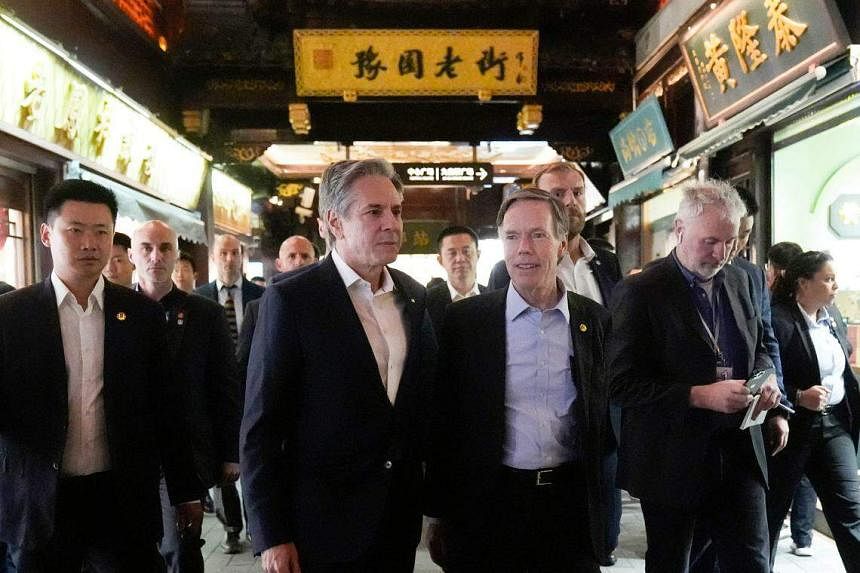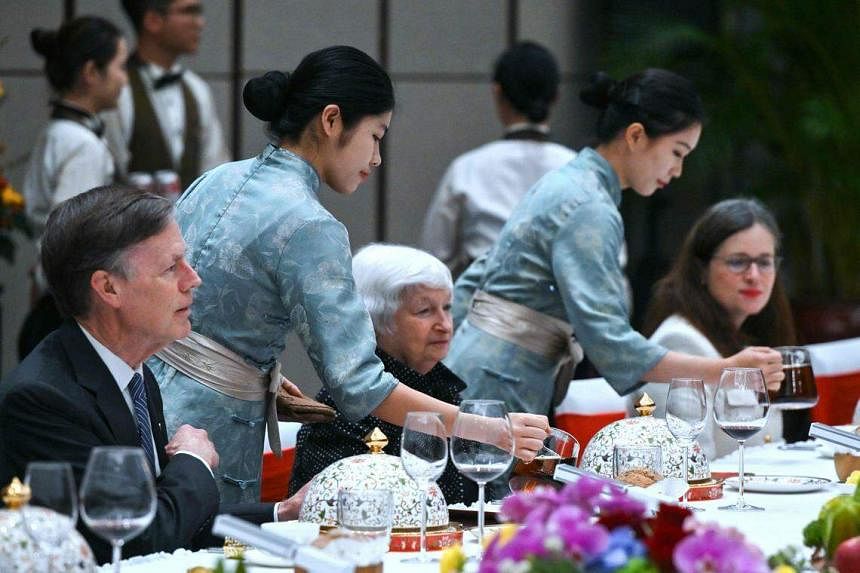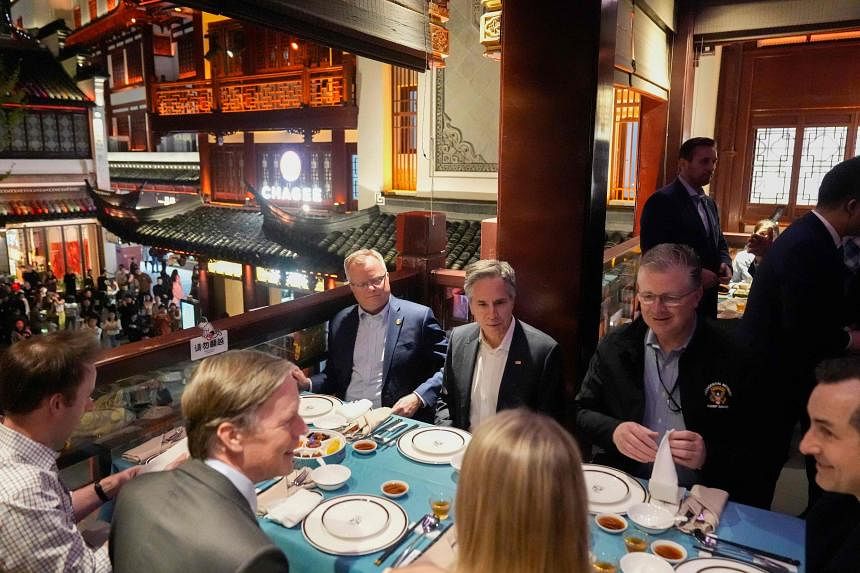BEIJING - Beijing beer made with American hops, to highlight the trade relationship between the two countries. Tibetan food, to send a human rights message. Mushrooms with possible hallucinogenic properties, just because they taste good.
Where, what and how US dignitaries eat when they visit China is a serious matter. Choices of restaurants and dishes are rife with opportunities for geopolitical symbolism, as well as controversy and mockery. Chopstick skills - or a lack thereof - can be a sign of cultural competence or illiteracy.
An exorbitantly expensive meal can make an official look out of touch. Too cheap or informal, and you risk appearing undignified. Authenticity, history, cooking technique and taste can all affect the perception of a meal choice.
When US Secretary of State Antony Blinken started a trip through China on April 24, part of the Biden administration’s efforts to stabilise the relationship between the two countries, some on Chinese social media wondered whether he would have time on his visit to Shanghai to stop and try some of the city’s famous xiao long bao (soup dumplings).
One recommendation that he do so came with something of a political warning: “Eating xiaolongbao is just like handling international relations,” a commentator wrote on Weibo. “If your attention slips even a little, you’ll burn your mouth.”
Mr Blinken did, in fact, visit a renowned soup dumpling restaurant that night. It’s unclear how much he considered the symbolism of his dumplings, but by indulging in a traditional popular snack, and by attending a basketball game, the optics suggested there was a more cordial spirit than on the trip he made last year, soon after a Chinese spy balloon drifting across the United States had heightened tensions.
While in Beijing, Mr Blinken visited a notable establishment, in addition to the city’s restaurants: Li-Pi Records. Mr Blinken - a musician who has touted “musical diplomacy” - bought two records: an album by Chinese rocker Dou Wei, and American singer Taylor Swift’s “Midnights”, which he described as a successful American export.

Mr Blinken’s eating habits have drawn far less interest than that of Treasury Secretary Janet Yellen. Over two trips, in April and in 2023, her meals in China attracted so much attention that the state-run Global Times deemed it a form of “food diplomacy”.
In 2023, Dr Yellen made headlines when, at a restaurant in Beijing serving cuisine from Yunnan province, she ate mushrooms that were revealed to be mildly toxic and could cause hallucinations if not cooked properly.
Dr Yellen later said she was not aware of the mushrooms’ potential hallucinogenic properties when she ate them and felt no abnormal effects. Still, the story sparked a brief craze for the mushrooms in China.
In April, during a four-day trip to China, Dr Yellen visited a famed Cantonese restaurant in Guangzhou, and a Sichuan restaurant in Beijing. The dishes she ordered were quickly posted online, drawing broad approval from commenters for the variety and affordability of the dishes ordered, for her chopstick skills, and for the fact that she and her team sat among other diners instead of in a private room.
The dishes Dr Yellen and her team ordered were classic meals from their respective regions and were not modified to foreign tastes, according to Fuchsia Dunlop, a London-based cook and food writer who specialises in Chinese cuisine.
“They haven’t chosen really expensive, showoff dishes and ingredients,” Ms Dunlop said, speaking about the Sichuan meal. “This is very much what everyday people in Sichuan like to eat. This menu was chosen for flavour, not prestige.”
According to a Treasury Department spokesperson, the department generally solicits suggestions from staff at the local embassy for restaurant recommendations when Dr Yellen travels. Then, Dr Yellen will research the restaurants herself and make the final decision.
On occasion, specific establishments will be chosen to convey a diplomatic message, the spokesperson added. She cited Dr Yellen’s visit in April to a brewery in Beijing that uses American hops, aimed to highlight the significance of American agricultural exports to China.

Some restaurants where Dr Yellen has dined have capitalised on her fame, including the Yunnan restaurant where she ate the mushrooms, which released a set menu based on what she ordered, called the “God of Money” menu, a nod to her position as Treasury secretary.
Dr Yellen isn’t the first US dignitary to turn Chinese restaurants into overnight sensations. In 2011, a visit by then-Vice President Joe Biden to a Beijing noodle restaurant sent its business skyrocketing, according to Chinese state media, and led the restaurant to create a “Biden set” noodle menu.
In 2014, after Mrs Michelle Obama visited a hot pot restaurant in the city of Chengdu, the restaurant said it would create an “American First Lady” set menu. Articles in Chinese media noted approvingly that Mrs Obama was able to handle the spicy soup, which was not toned down for a foreign palate.
Her visit to a Tibetan restaurant in the same city, however, attracted controversy, and her staff at the time readily acknowledged that the venue had been chosen deliberately to show support for the rights and religious liberties of Tibetans in China.
But for Mrs Obama’s husband and other US presidents, Chinese cuisine served at official state banquets is often Americanised or customised to better suit a foreign palette.
In 2009, President Barack Obama was served a Chinese-style beef steak and baked fish, according to Chinese state media, and in 2017, President Donald Trump ate dishes including kung pao chicken and stewed boneless beef in tomato sauce. Both meals finished with fruit ice cream, which is highly atypical of traditional Chinese meals.
But even those meals may hint at an international trend, Ms Dunlop said. Mr Obama’s menu contained “very safe, conservative choices that would be appealing to foreigners,” she said, while Trump’s menu was slightly more contemporary and showed off more Chinese cooking techniques.
That shift, Ms Dunlop said, “may reflect China feeling a bit more confident with Westerners’ familiarity with real Chinese food” in 2017 versus 2009. NYTIMES

